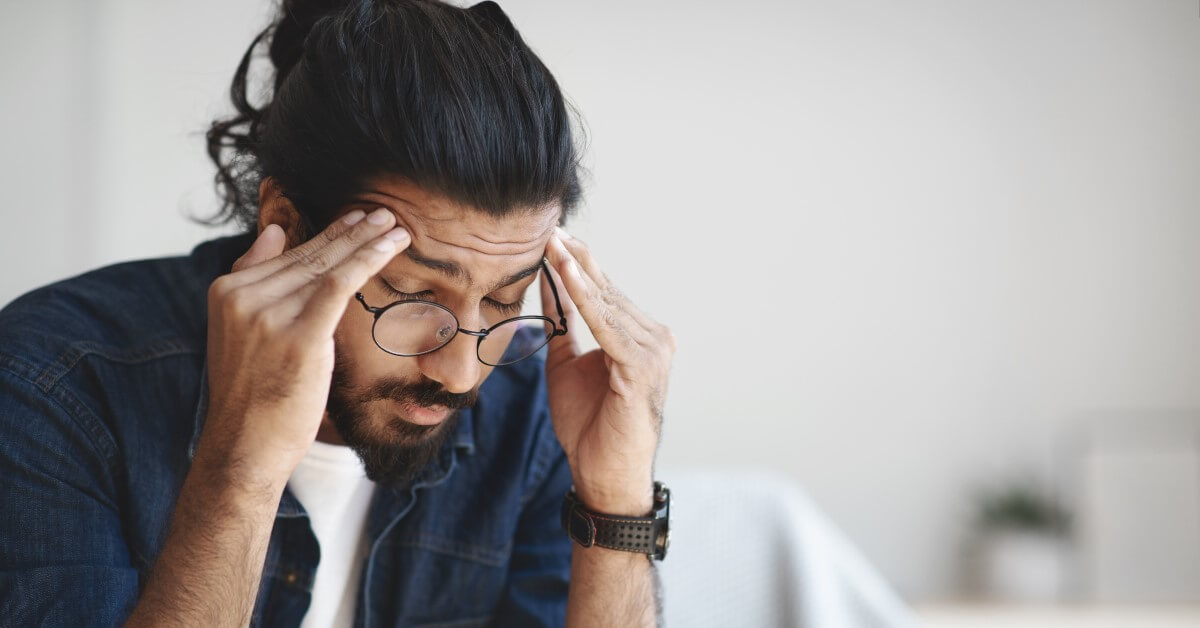A Paradigm-Shifting Study: Poor Sleep Quality and Migraines | Poor Sleep & Migraines? | The Next Steps
Overview
Experts have suggested the association between poor sleep and migraine for decades. Several studies have shown that both conditions are related bidirectionally.[1,2]
These studies indicate that poor sleep quality exacerbates migraine, worsens the quality of life of individuals living with the condition, and may raise the likelihood of migraine.[2,3]
Conversely, these studies also show that migraine is linked to many sleep abnormalities, including insomnia.[2,3]
Even though considerable research has been done on both conditions, only some studies explain the link between poor sleep quality and the risk of developing migraine.
New research shows the predictive value of sleep quality on the risk of developing migraine.[1]
This article will elaborate on this exceptional study and explain how poor sleep makes one more susceptible to migraine.
A Paradigm-Shifting Study: Poor Sleep Quality and Migraine
In an outstanding paper published in the Frontiers in Neurology Journal, leading experts in neurology have linked poor sleep to an increased risk of developing migraine.[1]
The researchers methodically investigated the connection between the quality of sleep and the likelihood of experiencing migraine while also considering gender and age disparities.
The study also examined the relationships between sleep quality and other migraine-related difficulties, such as pain burden and intensity, disability, mental troubles, and quality of life.[1]
The study participants included 134 participants with migraine and 70 healthy participants who served as a control group.
The researchers used the Pittsburgh Sleep Quality Index (PSQI), a standard self-report questionnaire used to evaluate sleep quality during a preceding month, to analyze the connections between the quality of sleep and the prevalence of migraine among the study participants.[1]
The study’s findings revealed that poor sleep quality is more prevalent among migraine sufferers than among those without migraine.
Roughly two-thirds of the participants with migraine reported poor sleep.[1] Also, the findings showed that poor sleep quality was strongly linked to a higher risk of developing migraine.
Even after considering various potential confounding factors, the risk of migraine in patients with poor sleep quality remained 3.981 times higher than the risk of developing migraine in individuals with good sleep quality.[1]
Dr. Zunjing Liu, one of the lead authors, remarked that the study confirmed that the Pittsburgh Sleep Quality Index (PSQI) score is particular for the diagnosis of migraine.
Furthermore, the researchers found that factors such as gender, age, and education significantly influence how well someone sleeps and their chance of developing migraine.
Women, patients aged 35 and older, and those with lower levels of education all showed stronger associations.[1]
In addition, the result of the study revealed that poor sleep worsened other difficulties associated with migraine, like mental health disturbances, total pain burden, and quality of life.[1]
Poor Sleep & Migraines
Experts still need to elucidate how poor sleep leads to migraine. However, several explanations have been put forward to describe this phenomenon.
Some experts have suggested that reducing REM sleep, a significant feature of poor sleep, predisposes individuals to more intense headaches.[4]
A recent study shows that sleep deprivation raises levels of proteins that lead to chronic pain, migraine headaches, and decreased pain tolerance.[4]
Another study by Spanish scientists shows that a lack of sleep can cause tension and migraine headaches, and disturbed sleep can aggravate headaches.[5]
Physiologically, this occurs because the brain structures and mechanisms that cause headaches are also responsible for sleep.
Furthermore, studies indicate poor sleep may diminish the body’s capacity to withstand pain.
According to research, those with insomnia and other sleep disorders may have a lower pain tolerance than those without sleep issues. This diminished pain threshold may result in more intense headaches following an episode of insomnia.
The Next Steps
Concerning the following steps, Liu suggested that the science and medical community focus on the association between sleep and migraine.
He remarked that the knowledge garnered from their study can be leveraged to create novel strategies for better migraine prevention and treatment.
Furthermore, Liu and the other contributors to the study advocated that PSQI tests should be included when evaluating patients with migraine. According to Liu, “the PSQI tool is convenient, practical, and accurate for determining sleep quality.
Furthermore, Liu stated, “Managing patients who suffer from migraine can also guide efforts for early prevention and sleep interventions.”
Liu expressed optimism that PSQI could be an excellent diagnostic tool for migraine in the future. “The PSQI score is great at predicting and diagnosing migraine. It could be used to predict migraine episodes, but this needs to be confirmed by more research in the future,” Liu said.
References:
- Duan, S., Ren, Z., Xia, H., Wang, Z., Zheng, T., & Liu, Z. (2022). Association between sleep quality, migraine and migraine burden. Frontiers in Neurology, 13, 955298. https://doi.org/10.3389/fneur.2022.955298Lin, Y.-K., Lin, G.-Y., Lee, J.-T., Lee, M.-S., Tsai, C.-K., Hsu, Y.-W., Lin, Y.-Z., Tsai, Y.-C., & Yang, F.-C. (2016). Associations between sleep quality and migraine frequency: A cross-sectional case-control study. Medicine, 95(17), e3554. https://doi.org/10.1097/MD.0000000000003554
- Kim, S. J., Han, K.-T., Jang, S.-Y., Yoo, K.-B., & Kim, S. J. (2018). The association between migraine and types of sleep disorder. International Journal of Environmental Research and Public Health, 15(12), 2648. https://doi.org/10.3390/ijerph15122648
- Haack, M., Simpson, N., Sethna, N., Kaur, S., & Mullington, J. (2020). Sleep deficiency and chronic pain: potential underlying mechanisms and clinical implications. Neuropsychopharmacology: Official Publication of the American College of Neuropsychopharmacology, 45(1), 205–216. https://doi.org/10.1038/s41386-019-0439-z
- Fernández-de-Las-Peñas, C., Fernández-Muñoz, J. J., Palacios-Ceña, M., Parás-Bravo, P., Cigarán-Méndez, M., & Navarro-Pardo, E. (2018). Sleep disturbances in tension-type headache and migraine. Therapeutic Advances in Neurological Disorders, 11, 1756285617745444. https://doi.org/10.1177/1756285617745444
- Sivertsen, B., Lallukka, T., Petrie, K. J., Steingrímsdóttir, Ó. A., Stubhaug, A., & Nielsen, C. S. (2015). Sleep and pain sensitivity in adults. Pain, 156(8), 1433–1439. https://doi.org/10.1097/j.pain.0000000000000131






